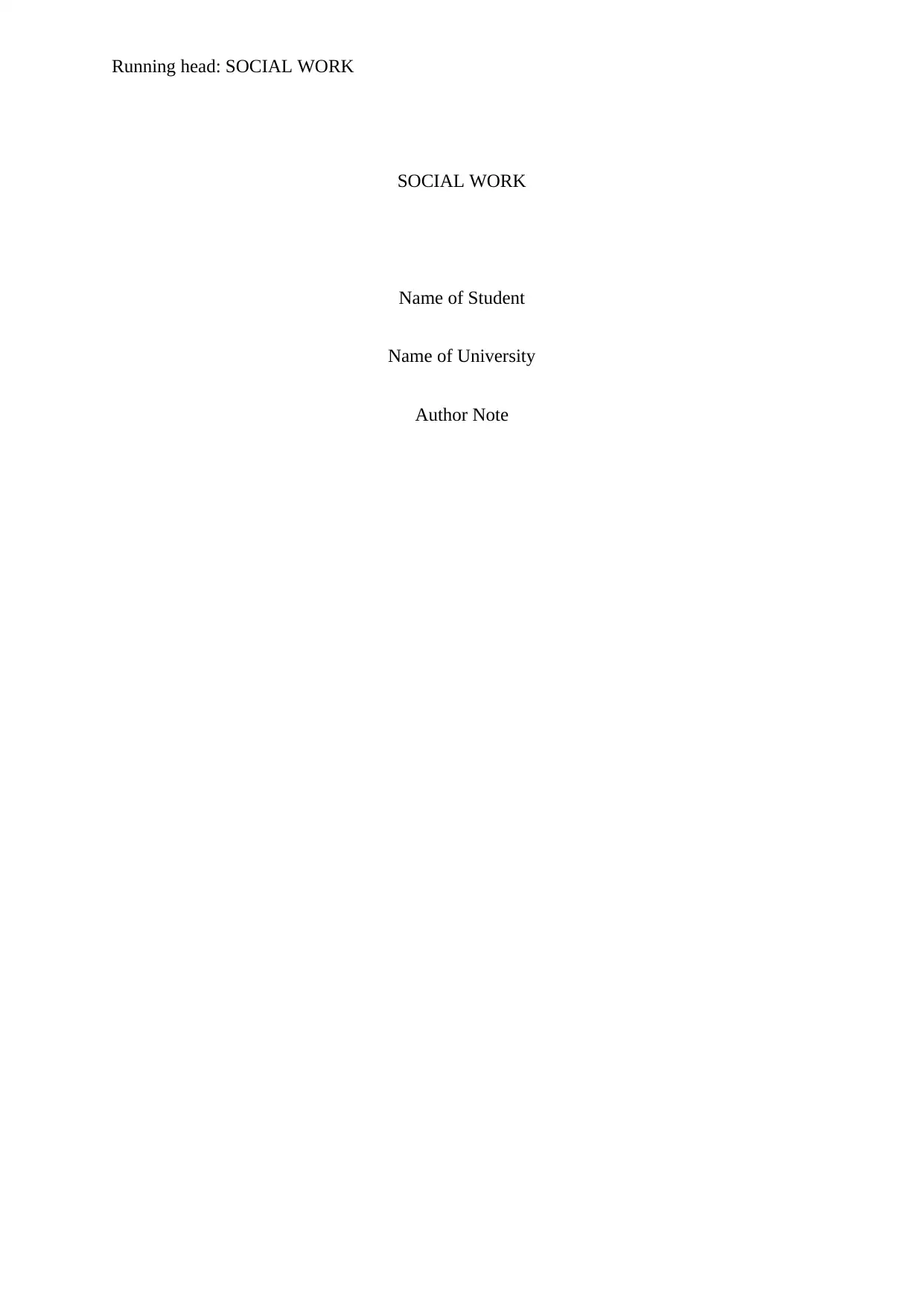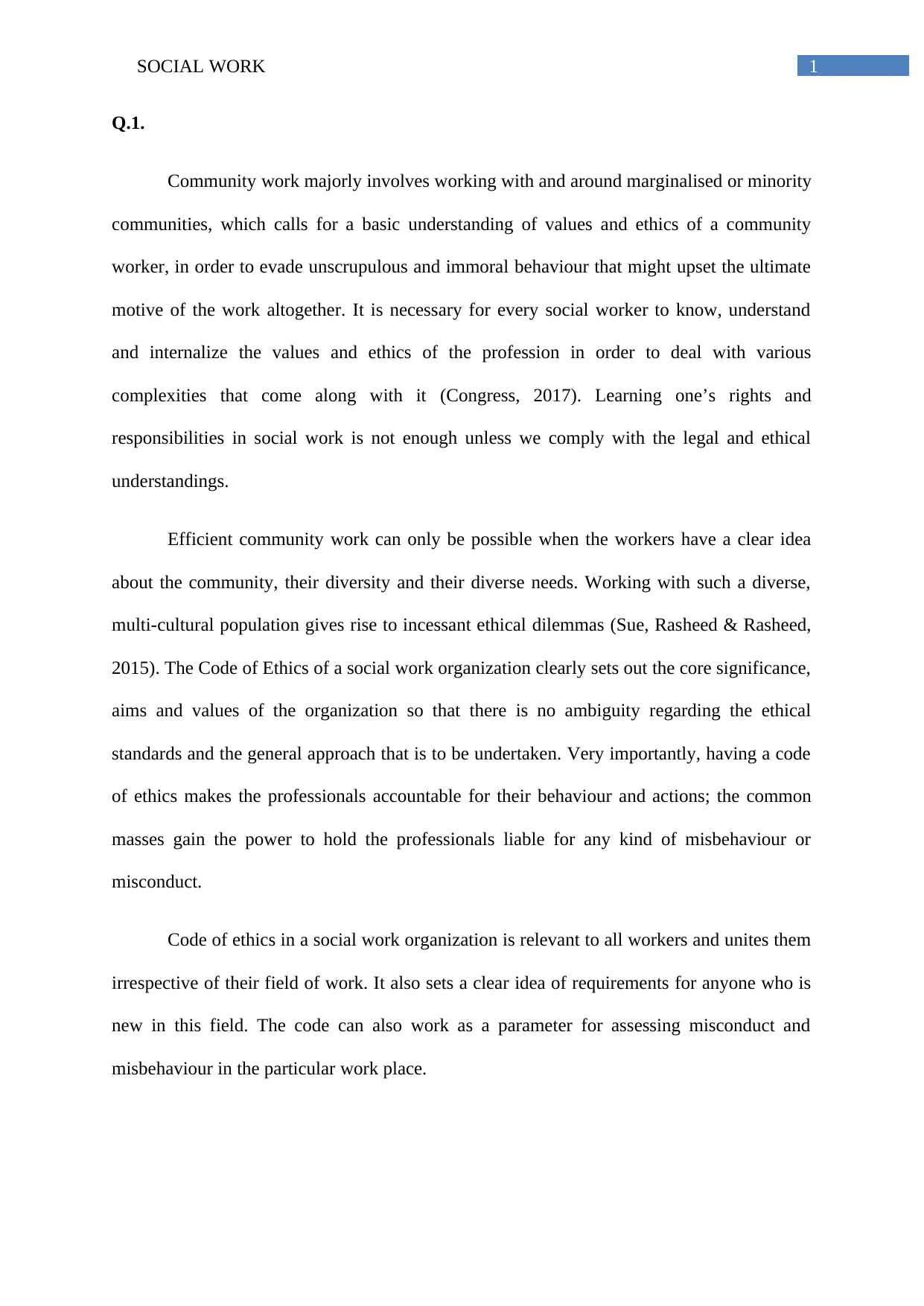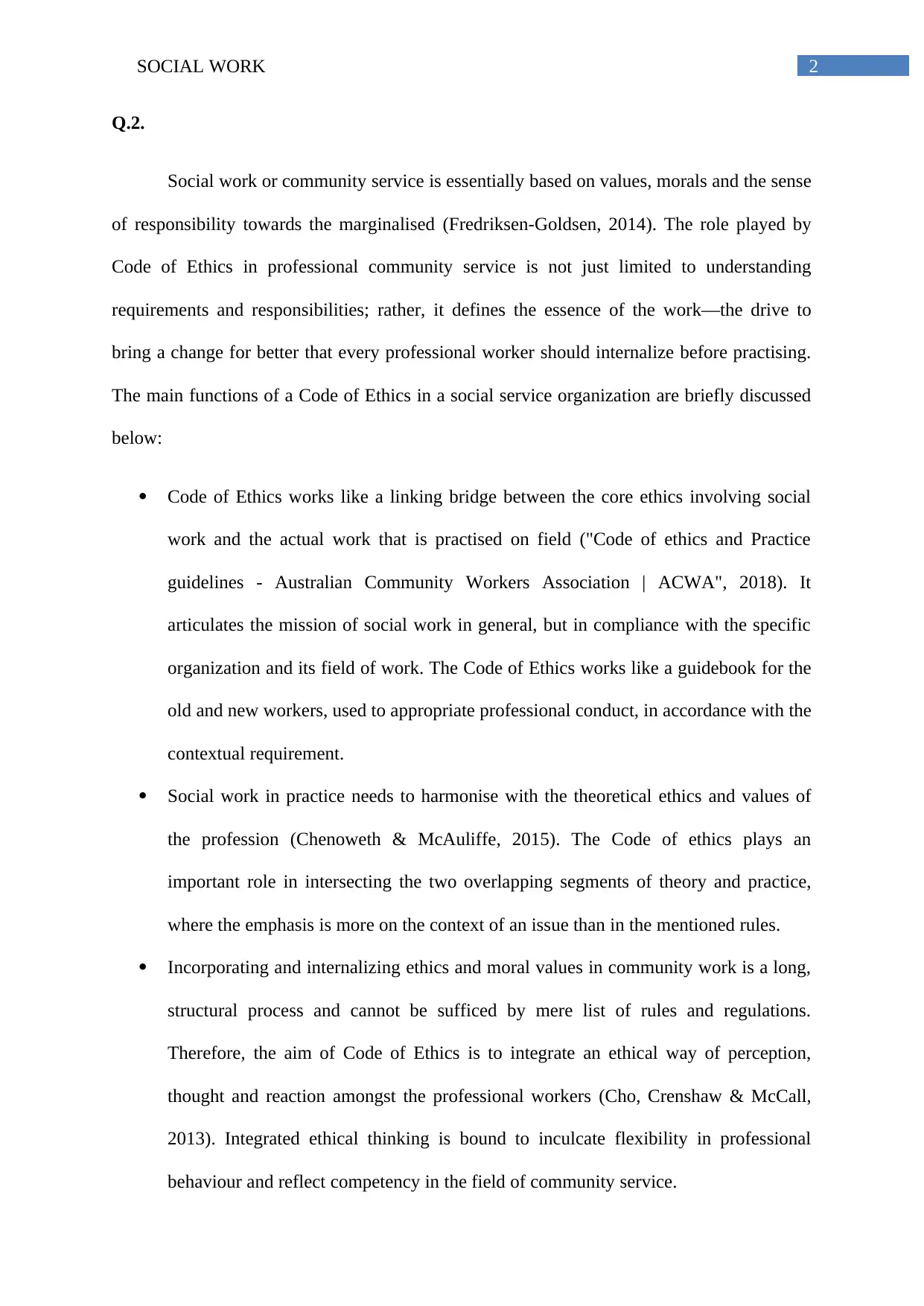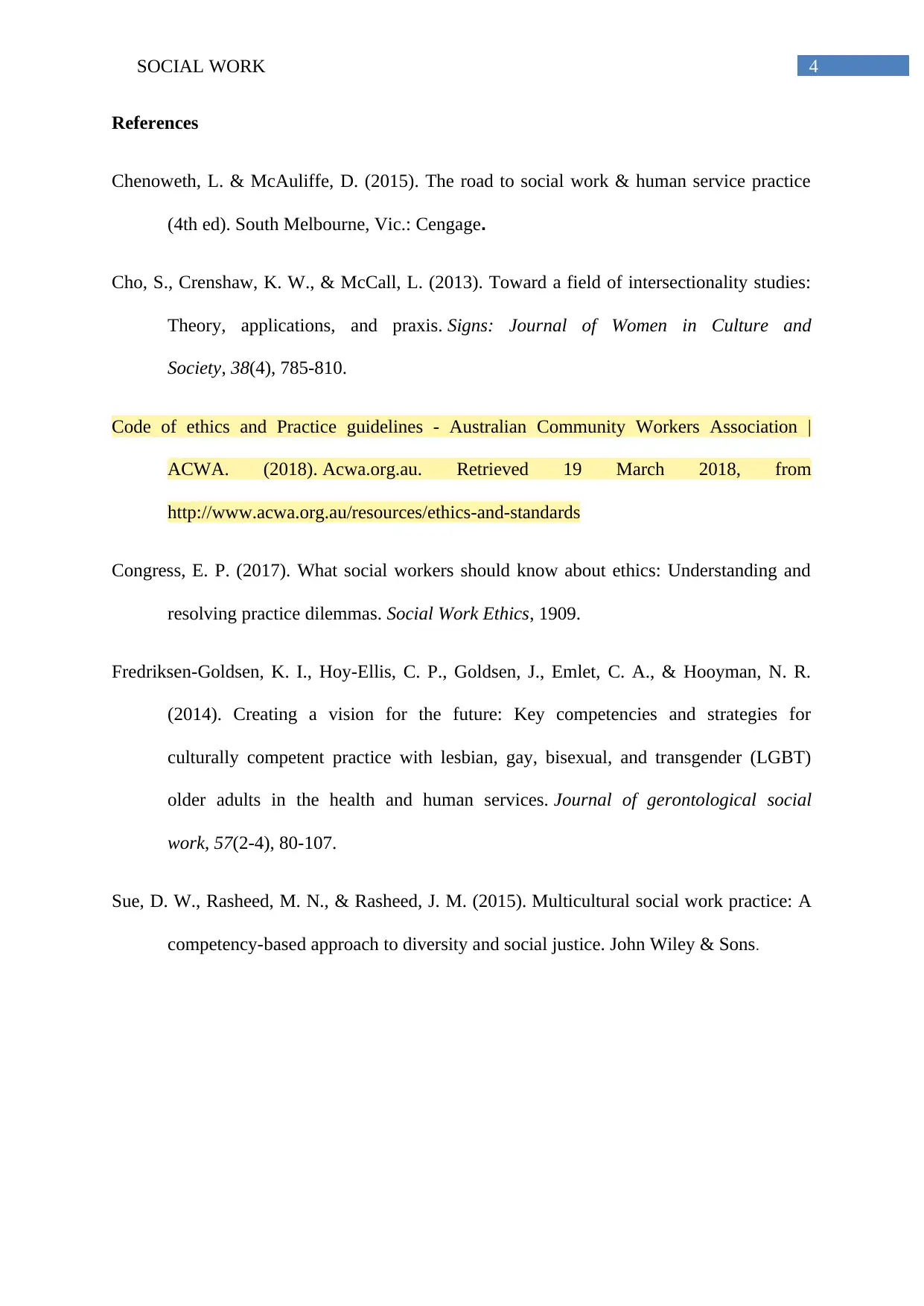Understanding Ethics and Values in Social Work Practice
VerifiedAdded on 2021/04/16
|5
|900
|41
Essay
AI Summary
This essay explores the critical role of ethics and values in social work, particularly within community-based practice. It emphasizes the necessity for social workers to understand and internalize ethical principles to effectively serve marginalized communities and navigate complex ethical dilemmas. The essay highlights the importance of a code of ethics in guiding professional conduct, ensuring accountability, and promoting consistent standards across the field. It also examines how the code of ethics serves as a bridge between theoretical values and practical application, fostering ethical thinking and flexibility in community service. The essay references key academic sources to support its arguments, offering a comprehensive overview of ethical considerations in the field of social work and community service.

Running head: SOCIAL WORK
SOCIAL WORK
Name of Student
Name of University
Author Note
SOCIAL WORK
Name of Student
Name of University
Author Note
Paraphrase This Document
Need a fresh take? Get an instant paraphrase of this document with our AI Paraphraser

1SOCIAL WORK
Q.1.
Community work majorly involves working with and around marginalised or minority
communities, which calls for a basic understanding of values and ethics of a community
worker, in order to evade unscrupulous and immoral behaviour that might upset the ultimate
motive of the work altogether. It is necessary for every social worker to know, understand
and internalize the values and ethics of the profession in order to deal with various
complexities that come along with it (Congress, 2017). Learning one’s rights and
responsibilities in social work is not enough unless we comply with the legal and ethical
understandings.
Efficient community work can only be possible when the workers have a clear idea
about the community, their diversity and their diverse needs. Working with such a diverse,
multi-cultural population gives rise to incessant ethical dilemmas (Sue, Rasheed & Rasheed,
2015). The Code of Ethics of a social work organization clearly sets out the core significance,
aims and values of the organization so that there is no ambiguity regarding the ethical
standards and the general approach that is to be undertaken. Very importantly, having a code
of ethics makes the professionals accountable for their behaviour and actions; the common
masses gain the power to hold the professionals liable for any kind of misbehaviour or
misconduct.
Code of ethics in a social work organization is relevant to all workers and unites them
irrespective of their field of work. It also sets a clear idea of requirements for anyone who is
new in this field. The code can also work as a parameter for assessing misconduct and
misbehaviour in the particular work place.
Q.1.
Community work majorly involves working with and around marginalised or minority
communities, which calls for a basic understanding of values and ethics of a community
worker, in order to evade unscrupulous and immoral behaviour that might upset the ultimate
motive of the work altogether. It is necessary for every social worker to know, understand
and internalize the values and ethics of the profession in order to deal with various
complexities that come along with it (Congress, 2017). Learning one’s rights and
responsibilities in social work is not enough unless we comply with the legal and ethical
understandings.
Efficient community work can only be possible when the workers have a clear idea
about the community, their diversity and their diverse needs. Working with such a diverse,
multi-cultural population gives rise to incessant ethical dilemmas (Sue, Rasheed & Rasheed,
2015). The Code of Ethics of a social work organization clearly sets out the core significance,
aims and values of the organization so that there is no ambiguity regarding the ethical
standards and the general approach that is to be undertaken. Very importantly, having a code
of ethics makes the professionals accountable for their behaviour and actions; the common
masses gain the power to hold the professionals liable for any kind of misbehaviour or
misconduct.
Code of ethics in a social work organization is relevant to all workers and unites them
irrespective of their field of work. It also sets a clear idea of requirements for anyone who is
new in this field. The code can also work as a parameter for assessing misconduct and
misbehaviour in the particular work place.

2SOCIAL WORK
Q.2.
Social work or community service is essentially based on values, morals and the sense
of responsibility towards the marginalised (Fredriksen-Goldsen, 2014). The role played by
Code of Ethics in professional community service is not just limited to understanding
requirements and responsibilities; rather, it defines the essence of the work—the drive to
bring a change for better that every professional worker should internalize before practising.
The main functions of a Code of Ethics in a social service organization are briefly discussed
below:
Code of Ethics works like a linking bridge between the core ethics involving social
work and the actual work that is practised on field ("Code of ethics and Practice
guidelines - Australian Community Workers Association | ACWA", 2018). It
articulates the mission of social work in general, but in compliance with the specific
organization and its field of work. The Code of Ethics works like a guidebook for the
old and new workers, used to appropriate professional conduct, in accordance with the
contextual requirement.
Social work in practice needs to harmonise with the theoretical ethics and values of
the profession (Chenoweth & McAuliffe, 2015). The Code of ethics plays an
important role in intersecting the two overlapping segments of theory and practice,
where the emphasis is more on the context of an issue than in the mentioned rules.
Incorporating and internalizing ethics and moral values in community work is a long,
structural process and cannot be sufficed by mere list of rules and regulations.
Therefore, the aim of Code of Ethics is to integrate an ethical way of perception,
thought and reaction amongst the professional workers (Cho, Crenshaw & McCall,
2013). Integrated ethical thinking is bound to inculcate flexibility in professional
behaviour and reflect competency in the field of community service.
Q.2.
Social work or community service is essentially based on values, morals and the sense
of responsibility towards the marginalised (Fredriksen-Goldsen, 2014). The role played by
Code of Ethics in professional community service is not just limited to understanding
requirements and responsibilities; rather, it defines the essence of the work—the drive to
bring a change for better that every professional worker should internalize before practising.
The main functions of a Code of Ethics in a social service organization are briefly discussed
below:
Code of Ethics works like a linking bridge between the core ethics involving social
work and the actual work that is practised on field ("Code of ethics and Practice
guidelines - Australian Community Workers Association | ACWA", 2018). It
articulates the mission of social work in general, but in compliance with the specific
organization and its field of work. The Code of Ethics works like a guidebook for the
old and new workers, used to appropriate professional conduct, in accordance with the
contextual requirement.
Social work in practice needs to harmonise with the theoretical ethics and values of
the profession (Chenoweth & McAuliffe, 2015). The Code of ethics plays an
important role in intersecting the two overlapping segments of theory and practice,
where the emphasis is more on the context of an issue than in the mentioned rules.
Incorporating and internalizing ethics and moral values in community work is a long,
structural process and cannot be sufficed by mere list of rules and regulations.
Therefore, the aim of Code of Ethics is to integrate an ethical way of perception,
thought and reaction amongst the professional workers (Cho, Crenshaw & McCall,
2013). Integrated ethical thinking is bound to inculcate flexibility in professional
behaviour and reflect competency in the field of community service.
⊘ This is a preview!⊘
Do you want full access?
Subscribe today to unlock all pages.

Trusted by 1+ million students worldwide

3SOCIAL WORK
Paraphrase This Document
Need a fresh take? Get an instant paraphrase of this document with our AI Paraphraser

4SOCIAL WORK
References
Chenoweth, L. & McAuliffe, D. (2015). The road to social work & human service practice
(4th ed). South Melbourne, Vic.: Cengage.
Cho, S., Crenshaw, K. W., & McCall, L. (2013). Toward a field of intersectionality studies:
Theory, applications, and praxis. Signs: Journal of Women in Culture and
Society, 38(4), 785-810.
Code of ethics and Practice guidelines - Australian Community Workers Association |
ACWA. (2018). Acwa.org.au. Retrieved 19 March 2018, from
http://www.acwa.org.au/resources/ethics-and-standards
Congress, E. P. (2017). What social workers should know about ethics: Understanding and
resolving practice dilemmas. Social Work Ethics, 1909.
Fredriksen-Goldsen, K. I., Hoy-Ellis, C. P., Goldsen, J., Emlet, C. A., & Hooyman, N. R.
(2014). Creating a vision for the future: Key competencies and strategies for
culturally competent practice with lesbian, gay, bisexual, and transgender (LGBT)
older adults in the health and human services. Journal of gerontological social
work, 57(2-4), 80-107.
Sue, D. W., Rasheed, M. N., & Rasheed, J. M. (2015). Multicultural social work practice: A
competency-based approach to diversity and social justice. John Wiley & Sons.
References
Chenoweth, L. & McAuliffe, D. (2015). The road to social work & human service practice
(4th ed). South Melbourne, Vic.: Cengage.
Cho, S., Crenshaw, K. W., & McCall, L. (2013). Toward a field of intersectionality studies:
Theory, applications, and praxis. Signs: Journal of Women in Culture and
Society, 38(4), 785-810.
Code of ethics and Practice guidelines - Australian Community Workers Association |
ACWA. (2018). Acwa.org.au. Retrieved 19 March 2018, from
http://www.acwa.org.au/resources/ethics-and-standards
Congress, E. P. (2017). What social workers should know about ethics: Understanding and
resolving practice dilemmas. Social Work Ethics, 1909.
Fredriksen-Goldsen, K. I., Hoy-Ellis, C. P., Goldsen, J., Emlet, C. A., & Hooyman, N. R.
(2014). Creating a vision for the future: Key competencies and strategies for
culturally competent practice with lesbian, gay, bisexual, and transgender (LGBT)
older adults in the health and human services. Journal of gerontological social
work, 57(2-4), 80-107.
Sue, D. W., Rasheed, M. N., & Rasheed, J. M. (2015). Multicultural social work practice: A
competency-based approach to diversity and social justice. John Wiley & Sons.
1 out of 5
Related Documents
Your All-in-One AI-Powered Toolkit for Academic Success.
+13062052269
info@desklib.com
Available 24*7 on WhatsApp / Email
![[object Object]](/_next/static/media/star-bottom.7253800d.svg)
Unlock your academic potential
Copyright © 2020–2026 A2Z Services. All Rights Reserved. Developed and managed by ZUCOL.





